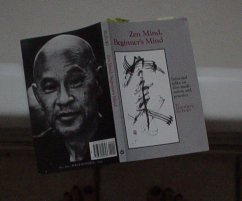|
sublingua | |||||
| The heart with a mind of its own.(Be present.) | The mind with a heart of its own.(It's past.) | The dream that is your waking life.(Go there now.) | |||
|
To Do Or Not To Do: That Is The Question
�Life Is Strange�But Compared To What?�
Of course, whatever we do is unusual, because our life itself is so unusual.��Shunryu Suzuki My copy of Shunryu Suzuki�s Zen Mind, Beginner�s Mind: Informal Talks on Zen Meditation and Practice was given to me by a friend, Tom, who was an ex-Jewish Buddhist from New York. He spent several years in military school, then in the Navy, then he worked on a fishing boat (and he has some great, mind-blowing stories about getting high and hallucinating that he was unloading things stranger than the huge tuna fish from the holds of those boats), then he went into a Buddhist monastery in Woodstock, New York, then he became a computer programmer. I met Tom in his computer programmer days, when he was married to a nice but high-strung Hispanic woman and working with Max and Ethan and Papa at a small company that produced software for banks all over the world. I don�t remember what prompted Tom to gift me with a copy of Zen Mind, Beginner�s Mind, but I do remember that I was all of 25 or 26 years old when he gave it to me. I read about half of the book, then had to walk away from it. I walked away because, as I read, I became overcome with the feeling that if I continued reading, then I was going to have to walk away from my life. My choice was the life I had then or the life the book offered. I knew the book was right and the life I was leading was wrong (and Shunryu Suzuki would probably rather have me spurn the use of �right� and �wrong� and say that the book was �to do� and my then-life was �not to do�). Frightened, I put the book away. I chose my then-life. I chose �not to do.� I argued with that book over every little point. You can see the bookmarks that I put in the book, each one either agreeing or not agreeing with Shunryu Suzuki. I underlined passages and wrote objections in the margins. I tried, in other words, to contort myself into understanding what was �to do� all the while living a life that was �not to do.� (Flipping through the book just now, looking for a specific passage, I found a receipt from my therapist, Beth, dated 1�7�1996. I was wrangling demons even then�originally as part of a court-ordered �anger management� program, but continuing for another four and a half years on my own.) In the end, there was no arguing with Shunryu Suzuki, so instead, I did what I do best: I walked away. �When you do something, you should burn yourself completely, like a good bonfire, leaving no trace of yourself.��Shunryu Suzuki Recently, however, I�ve considered returning. There is a Buddhist story that I read in one of Natalie Goldberg�s book Writing Down The Bones and which I like very much. Here is a quickly paraphrased version: A man and his elderly father are out in a boat fishing when the father falls out of the boat and begins to drown. Just then, the son has the revelation that he should go into a monastery, so he rows back to shore and does just that. You can�t get much more existential than that, now, can you? Do I return? Is it the thing to do, or is it the thing not to do? �I discovered that it is necessary, absolutely necessary, to believe in nothing.��Shinryu Suzuki
More lies:
|
|||||
